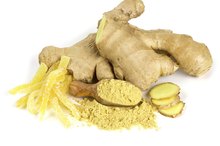Side Effects of the Curcumin in Turmeric
Turmeric is a spice often used in Asian dishes, and the curcumin in the spice is what's made turmeric useful as an herbal supplement. Curcumin is an antioxidant with anti-inflammatory properties. While studies on its effectiveness are limited, it may also help reduce cholesterol levels and prevent certain types of cancer. Turmeric isn't approved by the U.S. Food and Drug Administration to treat any diseases, and taking turmeric supplements can cause unpleasant or dangerous side effects. Talk to your doctor before taking turmeric or any other supplement.
Gastrointestinal Side Effects
Using turmeric in your cooking is considered safe and unlikely to cause side effects. Taking large doses of the spice or of supplements can result in gastrointestinal side effects. The most common gastrointestinal side effects are stomachache, gas, nausea and indigestion. Talk to your doctor and reduce the amount of turmeric you're taking if you experience any of these side effects. Taking turmeric for long periods can cause ulcers in some people due to increasing stomach acid, according to the University of Maryland Medical Center.
- Using turmeric in your cooking is considered safe and unlikely to cause side effects.
- Taking large doses of the spice or of supplements can result in gastrointestinal side effects.
Gallbladder and Kidney Problems
Can Turmeric Cause Blood Sugar Levels to Drop?
Learn More
The curcumin in turmeric encourages the gallbladder to produce more bile, which may improve digestion. Because of the extra bile production, people who have gallstones or other conditions that block bile passages shouldn't take turmeric before consulting with their doctors, cautions the American Cancer Society. Turmeric may also contribute to the formation of kidney stones, particularly in people who have conditions that increase the risk of kidney stones. A study published in the "American Journal of Clinical Nutrition" in 2008 found that participants who took turmeric had higher urinary oxalate levels. Oxalate is a waste product that should leave the body during urination, but if there's too much oxalate, it can bind with calcium and form kidney stones.
- The curcumin in turmeric encourages the gallbladder to produce more bile, which may improve digestion.
Pregnancy Concerns
Pregnant women shouldn't take turmeric as a supplement. According to MedlinePlus, the curcumin can stimulate the uterus or encourage the uterine lining to shed, which could increase the risk of miscarriage. It's generally considered safe for pregnant women to eat food flavored with turmeric, but pregnant women should talk to their doctors or midwives about any concerns with the spice before using it.
Drug Interactions
Turmeric to Dissolve Blood Clots
Learn More
Because turmeric can increase stomach acid, reports the University of Maryland Medical Center, it can interfere with the efficacy of drugs that reduce acid, such as acid reflux medications. The spice can also increase the effectiveness of some drugs, including blood thinners and diabetes medications. Taking turmeric with blood thinners can increase the risk of bleeding. This includes taking it with other herbs that act as blood thinners, including ginger, garlic, clove, ginseng and willow. Diabetics who take medication to help lower their blood sugar levels shouldn't take turmeric because it can drop blood sugar to potentially dangerous levels.
- Because turmeric can increase stomach acid, reports the University of Maryland Medical Center, it can interfere with the efficacy of drugs that reduce acid, such as acid reflux medications.
Related Articles
References
- American Cancer Society: Turmeric
- University of Maryland Medical Center: Turmeric
- American Journal of Clinical Nutrition: Effect of Cinnamon and Turmeric on Urinary Oxalate Excretion, Plasma Lipids, and Plasma Glucose in Healthy Subjects
- UW Health: Oxalate
- Hewlings SJ, Kalman DS. Curcumin: A Review of Its' Effects on Human Health. Foods. 2017;6(10)
Writer Bio
Amanda Knaebel is a self-professed gadget geek and loves all things tech, both new and old. Amanda has been working as a freelance writer for over 10 years on topics including technology, health, fitness, nutrition, gardening and many more. She has also worked with Fortune 50 tech and financial companies, both in technical support and content production.









